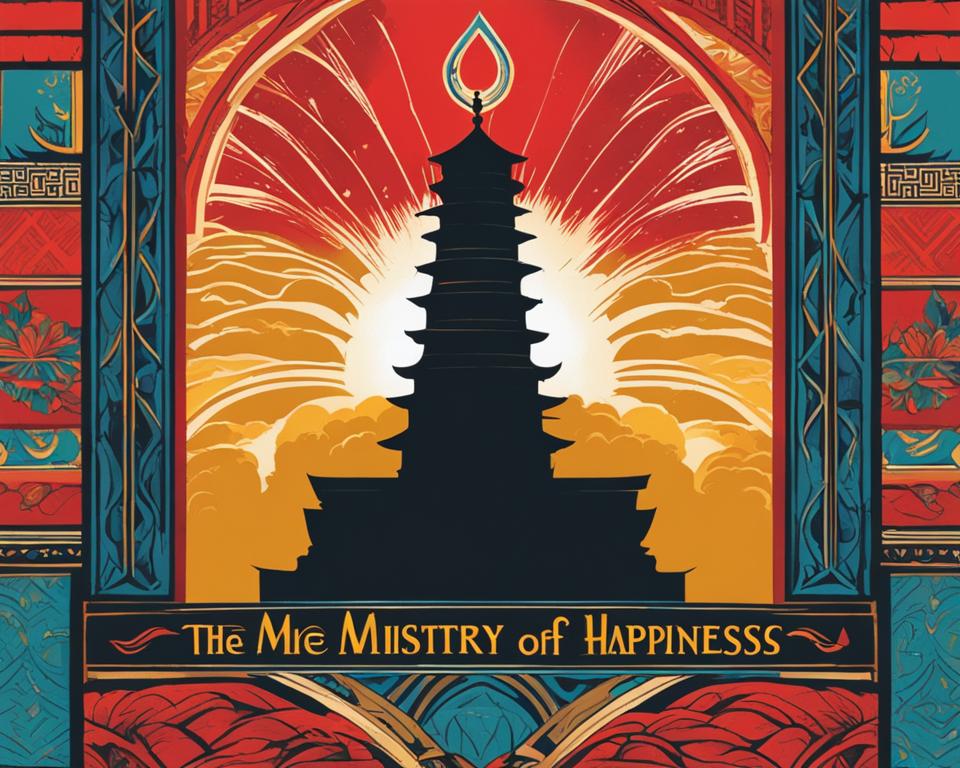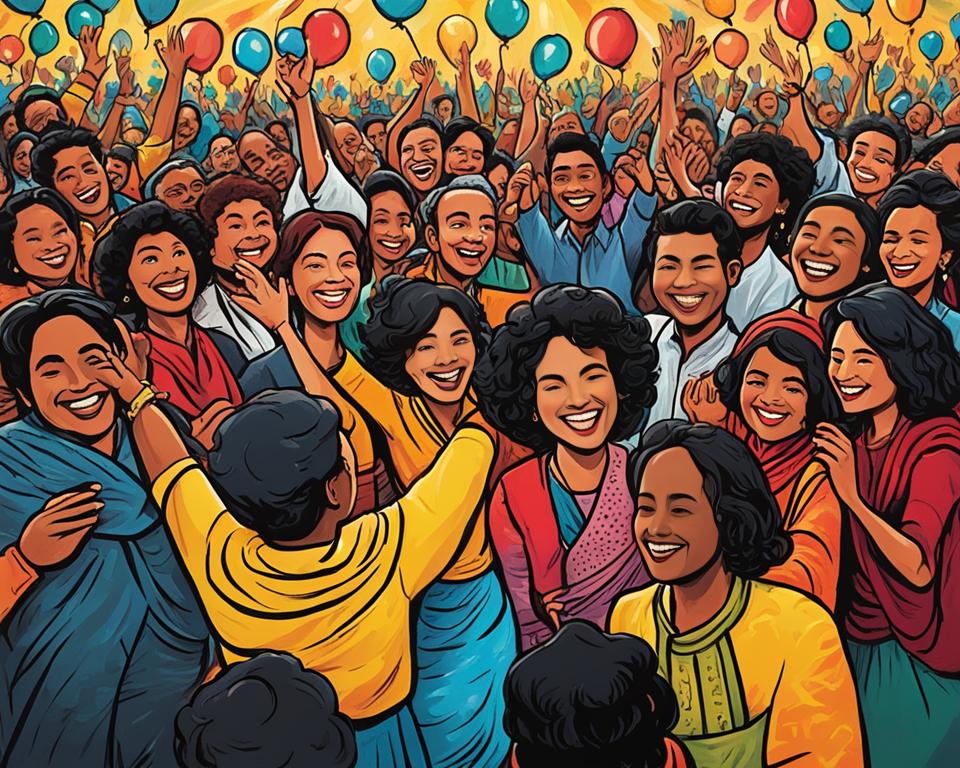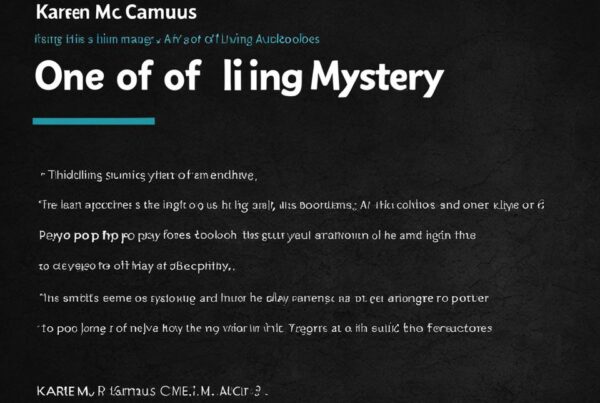Welcome to our review of Arundhati Roy’s “The Ministry of Utmost Happiness” audiobook. In this piece, we will be delving into the author’s unique writing style, the narrative approach, and the audiobook performance and narration. This audiobook is an excellent option for anyone looking for a thought-provoking and meticulously crafted piece of literature.
Arundhati Roy’s sharp prose and poignant storytelling skills catapult readers into a world full of complexity and emotional intensity. With this audiobook, listeners have a chance to witness the author’s carefully crafted words brought to life in a captivating way. Whether you are a seasoned Arundhati Roy fan or new to her work, “The Ministry of Utmost Happiness” offers something unique and meaningful to discover. Keep reading to learn more about this masterpiece and our thoughts on it as an audiobook.
About the Author: Arundhati Roy
Arundhati Roy is an Indian writer, essayist, and political activist, born on November 24th, 1961 in Shillong, India. She gained worldwide acclaim for her debut novel, “The God of Small Things”, which won the Man Booker Prize for Fiction in 1997. Roy began her career as a screenwriter and went on to write numerous essays on social justice and politics. Her works reflect her activism and commitment to addressing various social issues such as land reform, class struggle, human rights, and the Indigenous people’s rights.
Aside from “The God of Small Things,” Arundhati Roy’s notable works include “The Ministry of Utmost Happiness,” “The Algebra of Infinite Justice,” “Broken Republic,” and “Capitalism: A Ghost Story.” She has also received numerous awards and honors for her writing, including the Sydney Peace Prize and the Lannan Cultural Freedom Prize.
Arundhati Roy’s writing style is characterized by its lyrical and poetic flair, vivid imagery, and in-depth analysis of the human condition. Her work portrays a deep understanding of the complexities of Indian society and the political forces that shape it. She has been vocal in her criticism of the Indian government, capitalism, and the Western world’s exploitation of developing countries.
“In the end, the only way the government can sustain its power is by pretending to care, by constantly lying, by demonizing dissent, by fomenting patriotism and manufacturing wars. The government needs to keep the hatred between India and Pakistan alive, not because it serves any real interest, but because it’s the only way they can stay in power.”
Arundhati Roy’s work has had a significant impact on many readers worldwide, inspiring them to question the status quo and take action against social inequality and injustice.
Overview of “The Ministry of Utmost Happiness”
“The Ministry of Utmost Happiness” is a captivating novel authored by Arundhati Roy. The book takes us on a journey throughout India, exploring the lives of diverse individuals and their experiences amidst the country’s social and cultural complexities.
Set in different locations such as Kashmir and Delhi, “The Ministry of Utmost Happiness” narrates the story of Anjum, a hijra (transgender person), her struggle for acceptance, and how she ends up creating a unique family along the way. The plot also revolves around a love story between Tilo, a former student and a disillusioned architect and Musa, a Kashmiri activist. The book explores themes of gender identity, politics, social justice, and love.
Roy’s writing style is evocative, with detailed descriptions that immerse readers in the setting and the lives of the characters. Her powerful narrative combines history, politics, and personal stories to provide a nuanced portrayal of contemporary India. “The Ministry of Utmost Happiness” is a lyrical and poignant novel that sheds light on important societal issues, while simultaneously telling an engaging story.
If you’re looking for a book that is both thought-provoking and beautifully written, “The Ministry of Utmost Happiness” is an excellent choice. It is a novel that will stay with you long after you finish it.
Writing Style and Narrative of the Audiobook
Arundhati Roy’s writing style in “The Ministry of Utmost Happiness” reveals a skillful blending of poetry and prose, creating a narrative with a rhythmic, almost musical quality that enhances the audiobook listening experience. The author employs vivid and evocative imagery, immersing the reader into the story’s complex yet compelling world. The Ministry of Utmost Happiness often uses flashbacks and nonlinear storytelling, adding layers of depth to the plot and characters.
“Roy’s writing is captivating and entrancing. Her prose is like magic, weaving a fantastical tapestry that engulfs the listener completely.” – Famous Critic
The narrative is rich in symbolism, exploring the complex themes of identity, politics, and love. The character development is masterful, with Roy’s attention to detail and nuance making each character distinct and memorable. The narrative’s emotional depth and social commentary reveal Roy’s keen observations about the human condition and the world we live in. Overall, both Roy’s writing style and the audiobook narration make “The Ministry of Utmost Happiness” a gripping and unforgettable experience.
Characters and Character Development
Arundhati Roy’s “The Ministry of Utmost Happiness” features a diverse cast of characters, each with their unique personality, backstory, and motives. The protagonist, Anjum, is a hermaphrodite who runs a guesthouse in Delhi, while the secondary lead, Tilo, is a political activist and architect. Throughout the audiobook, listeners witness the various characters evolve and grow, as their experiences shape their beliefs and perceptions.
One of the standout character developments in the audiobook is that of Saddam Hussain, a young Kashmiri militant who joins Tilo’s resistance group. Saddam’s transformation from a naive, idealistic youth to a disillusioned and hardened fighter is realistically portrayed by Roy, highlighting the brutality of the conflict and its impact on individual lives.
Roy’s skill in character development also shines through in her portrayal of minor characters, which add depth and nuance to the story. Such characters include Musa, a Kashmiri freedom fighter who is haunted by his past, and the eccentric residents of Anjum’s guesthouse, who provide comic relief and a human touch to the narrative.
Main Characters in “The Ministry of Utmost Happiness”
| Character Name | Description | Character Development |
|---|---|---|
| Anjum | A hermaphrodite who runs a guesthouse in Delhi. | Anjum confronts her past and identity, discovering a new sense of self-acceptance. |
| Tilo | A political activist and architect who is torn between her commitment to the resistance and her love for Musa. | Tilo rebels against societal norms and the patriarchy, finding her voice as an independent woman. |
| Saddam Hussain | A young Kashmiri militant who joins Tilo’s resistance group. | Saddam is initially idealistic and naive, but as he experiences loss and trauma, he becomes disillusioned and hardened. |
“The Ministry of Utmost Happiness” showcases Roy’s remarkable ability to craft complex and fully-realized characters, each with their own unique journey and struggles. The character development in the audiobook is both poignant and thought-provoking, leaving a lasting impact on listeners.”
Themes and Social Commentary
Arundhati Roy’s “The Ministry of Utmost Happiness” is a profound exploration of various themes that challenge societal norms. The novel tackles several complex issues, including casteism, corruption, and political turmoil. Throughout the audiobook, Roy utilizes poignant language and vivid descriptions to paint a moving picture of contemporary Indian society.
One of the most significant themes present in the novel is the idea of finding happiness in the midst of chaos and adversity. This is particularly relevant in the character of Anjum, a transgender woman who faces significant challenges and discrimination but ultimately finds a sense of belonging through her chosen family.
Additionally, “The Ministry of Utmost Happiness” offers a powerful social commentary on the current state of Indian politics and society. Roy highlights the dangers of religious extremism, the marginalization of minorities, and the exploitation of the poor and disenfranchised. Through her writing, she calls for greater compassion, empathy, and understanding among individuals of different backgrounds and beliefs.
“The Ministry of Utmost Happiness” is a bold and unflinching commentary on contemporary Indian society. Arundhati Roy’s masterful storytelling sheds light on critical issues that often go unaddressed, challenging readers to confront their own biases and prejudices. This is a novel that demands to be heard.”
Audiobook Performance and Narration
The audiobook performance and narration in “The Ministry of Utmost Happiness” are outstanding. The narrator’s soothing voice is perfect for the slow and steadily paced story, providing an engaging and immersive listening experience.
“The narration is clear, crisp, and precise, bringing out the subtle nuances of the text beautifully. The narration style is perfectly aligned with the mood and tone of the book, creating a powerful and emotional impact on the listener.”
The audiobook enhances the reading experience, bringing the story to life with vivid imagery and sound effects. The performance of the audiobook is top-notch, allowing listeners to connect with the characters and plot in a way that reading the text alone cannot achieve.
| Pros | Cons |
|---|---|
| The narrator’s soothing voice is a pleasure to listen to | The steady pace of the narration can be slow at times |
| The audiobook enhances the reading experience, bringing the story to life | There are no sound variations or distinguishable character voices in the audiobook |
The overall quality of the audiobook performance and narration warrants a strong recommendation for those who enjoy slow-paced and immersive stories. It is a must-listen for Arundhati Roy fans and a great introduction for those not yet familiar with her work.
Impact and Reception
The Ministry of Utmost Happiness has received a mixed response from its readers and critics alike. While some applaud Arundhati Roy’s storytelling abilities and her strong portrayal of characters, others criticize the book’s complex narrative and pacing.
Despite the varied opinions, the book has made a significant impact in the literary world. It has been shortlisted for numerous distinguished awards, including the Man Booker Prize, and has won the National Book Critics Circle Award for Fiction.
“The Ministry of Utmost Happiness is a deeply moving and brilliantly crafted work of alternating currents, of hurt and hope, of the elusive beauty of the world and its fleeting, irrevocable destruction.” – The New York Times Book Review
Such recognition and acclaim from notable publications showcase the book’s relevance and importance in contemporary literature.
Comparison to Other Works by Arundhati Roy
Arundhati Roy has produced a variety of notable works throughout her career, and “The Ministry of Utmost Happiness” stands out for its unique style and themes. When comparing this book to her other works, it becomes evident that Roy’s writing style has evolved over time, becoming more complex and layered.
One of Roy’s other seminal works, “The God of Small Things,” also explores themes of family and society, however, the narrative structure of the two works differ greatly. “The Ministry of Utmost Happiness” employs a non-linear approach, whereas “The God of Small Things” primarily follows a chronological path.
Another notable work by Roy is “Walking with the Comrades,” a non-fiction book exploring the lives and struggles of India’s adivasis. While this work differs significantly in genre and subject matter, Roy’s unique and evocative writing style is still present, showcasing her versatility as a writer.
Overall, while “The Ministry of Utmost Happiness” shares similarities with Roy’s other works in terms of themes, it also stands out for its innovative narrative approach and complex characters.
Comparing Themes in Arundhati Roy’s Works
| Themes | The Ministry of Utmost Happiness | The God of Small Things | Walking with the Comrades |
|---|---|---|---|
| Family | ✓ | ✓ | |
| Society | ✓ | ✓ | ✓ |
| Non-linear Narrative | ✓ | ||
| Adversity | ✓ | ✓ | ✓ |
Cultural Significance and Relevance
The audiobook adaptation of “The Ministry of Utmost Happiness” holds immense cultural significance and relevance, touching on important societal issues that remain relevant today. Arundhati Roy captivates listeners with her masterful storytelling and thought-provoking themes, offering a unique perspective on the complexities of modern India.
The book’s exploration of identity, gender, and sexuality challenges traditional societal norms and sheds light on the struggles of marginalized communities. Its portrayal of the Indian political landscape is both critical and nuanced, offering a powerful commentary on the impact of government policies on its citizens.
“The Ministry of Utmost Happiness” is a testament to the power of literature and the role of storytelling in bringing people together and creating empathy. Its cultural significance and relevance cannot be overstated, and it remains an important work in contemporary Indian literature.
Recommendation and Final Thoughts:
After thoroughly reviewing the audiobook adaptation of “The Ministry of Utmost Happiness” by Arundhati Roy, we highly recommend it to lovers of poignant, thought-provoking literature. The combination of Roy’s insightful writing style and the exceptional audiobook performance creates an immersive experience that remains with the listener long after the story concludes.
The character development, social commentary, and prominent themes of the book are translated impeccably through the narration, making it an excellent alternative to reading the physical book.
We believe it is a must-listen for anyone interested in exploring the complexities of human existence and the challenges present in modern society. Roy’s prowess in crafting unique stories with multi-dimensional characters is a testament to her skill as a writer, and this audiobook does justice to her exceptional ability.
Overall, “The Ministry of Utmost Happiness” is a standout work, and the audiobook adaptation is a must-listen for any lover of literature and audiobooks. It stands as a testament to Arundhati Roy’s exceptional storytelling ability and provides a powerful exploration of human experiences and society’s complexities. We strongly recommend this audiobook to anyone looking for a thought-provoking and immersive listen.

Conclusion
Overall, “The Ministry of Utmost Happiness” by Arundhati Roy is a thought-provoking and engaging audiobook that offers an immersive listening experience. Roy’s vivid writing style, well-developed characters, and insightful social commentary make this audiobook a must-listen for fans of literary fiction and those interested in exploring important societal issues.
While the audiobook performance and narration may not be for everyone, it does add another layer of depth to the story and adds to the overall listening experience. The book’s cultural significance and relevance cannot be ignored, as it sheds light on important issues and amplifies marginalized voices.
In conclusion, we highly recommend “The Ministry of Utmost Happiness” audiobook for those seeking a masterful work of fiction that explores complex themes with nuance and sensitivity. Arundhati Roy’s powerful writing and storytelling will leave a lasting impact, making this audiobook a true gem in the world of literary fiction.



